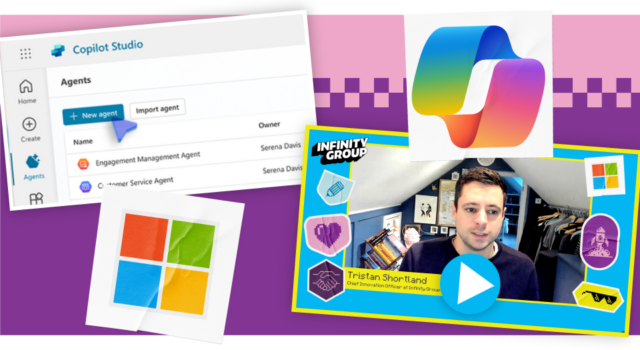The days where artificial intelligence was reserved for research labs, tech giants and science fiction movies are gone. It’s now a transformative force reshaping how businesses of varying sizes operate, compete and grow in their day-to-day operation. For your business, it represents a unique opportunity to unlock efficiencies, drive innovation and deliver smarter customer experiences.
From predictive analytics to intelligent automation, AI is becoming embedded in the digital fabric of modern enterprises. And at the forefront of this revolution is Microsoft. Their AI-powered platforms and tools are helping organisations turn data into decisions and ideas into impact.
In this blog, we’ll explore what Microsoft is offering across the AI space for your business.
What is artificial intelligence?
Artificial Intelligence (AI) is the capability of machines to perform tasks that typically require human intelligence. Examples include understanding language, recognising patterns, making decisions and learning from experience. Unlike traditional software that follows fixed rules, AI systems can adapt based on the data they process. This enables more dynamic and intelligent outcomes.
For businesses, AI is a strategic asset. It allows organisations to unlock new levels of efficiency, agility and insight. From automating routine operations to predicting customer behaviour and optimising supply chains, AI is reshaping how companies compete and grow. It empowers leaders to make faster, data-driven decisions, enhances customer experiences through personalisation and supports innovation by uncovering opportunities that would otherwise remain hidden.
As digital transformation accelerates, AI is becoming embedded in the core of enterprise systems. The ability to harness AI effectively is now a key differentiator for organisations looking to stay ahead. With the right tools and strategy, AI can turn data into decisions, streamline operations and drive meaningful business outcomes.
Microsoft and the evolution of AI
Microsoft has invested in decades of AI foundational research. Unlike companies that treat AI as a standalone innovation, Microsoft has embedded AI into the core of its business platforms – making it a practical tool for solving complex organisational challenges.
The company’s early investments in machine learning and natural language processing laid the groundwork for what would become a broad and mature AI ecosystem. Microsoft Research, established in 1991, has played a pivotal role in advancing AI theory and application, contributing to breakthroughs in areas such as deep learning, computer vision and reinforcement learning. These innovations have gradually transitioned from the lab into products like Microsoft 365, Dynamics 365 and Azure, where they now support millions of users globally.
One of the key reasons Microsoft leads in enterprise AI is its ability to scale AI responsibly. Through Azure, Microsoft offers a robust infrastructure for building and deploying AI models, with tools that support everything from low-code development to advanced machine learning operations. Azure AI services are designed to be modular and interoperable, allowing organisations to integrate AI into existing systems without overhauling their architecture.
Microsoft’s leadership also stems from its commitment to ethical and transparent AI. As regulatory frameworks like GDPR have reshaped how data is handled, Microsoft has responded by building governance tools that help organisations manage data lineage, model interpretability, and compliance. This focus on responsible AI is not just a legal necessity; it’s a strategic differentiator in industries where trust and accountability are paramount.
Microsoft’s AI offerings
With years of development and research into AI, Microsoft now offers a comprehensive suite a solutions to help your business access AI for your needs, without restricting it to highly technical teams. Here’s what’s on offer.
Microsoft 365: AI for everyday productivity
Microsoft 365 Copilot brings generative AI directly into the productivity tools employees use daily – Word, Excel, PowerPoint, Outlook and Teams. It acts as a contextual assistant, using large language models combined with Microsoft Graph data to help users draft documents, summarise meetings, analyse spreadsheets and manage emails more efficiently.
For example, in Word, Copilot can generate first drafts based on prompts or existing documents. In Excel, it can identify trends, create models and suggest visualisations. In Teams, it can summarise meetings in real time, highlight action items and even answer questions about what was discussed. These capabilities are designed to reduce cognitive load and free up time for higher-value work.
Because Copilot is integrated with Microsoft 365’s security, compliance and identity frameworks, it respects existing permissions and data boundaries, making it enterprise-ready from day one.
Dynamics 365: AI for business applications
Dynamics 365 Copilot brings generative AI into business processes across sales, customer service, marketing and operations. It helps sales teams draft personalised emails, summarise customer interactions and generate meeting prep notes. In customer service, it assists agents by suggesting responses, surfacing relevant knowledge articles, and even automating case summarisation.
These features are built to work with real-time business data, enabling faster decision-making and more responsive customer engagement. Because Copilot is embedded within Dynamics 365, it enhances existing workflows rather than replacing them, making adoption seamless for users.
Azure AI: Building custom AI solutions
Azure AI provides the infrastructure and tools for organisations to build, train, and deploy custom AI models. It includes:
- Azure Machine Learning for managing the full ML lifecycle, including training, deployment and monitoring.
- Azure Cognitive Services, offering pre-built APIs for vision, speech, language and decision-making tasks.
- Azure OpenAI Service, which gives organisations access to powerful generative models like GPT for use in chatbots, summarisation and content generation.
- Azure AI Search, which combines search indexing with AI to extract insights from structured and unstructured content.
These services are modular and scalable, allowing organisations to tailor AI solutions to their specific needs while maintaining control over data, governance and compliance.
Power Platform: Low-code AI
The Power Platform brings AI capabilities to non-developers through low-code tools:
- Power BI uses AI to detect patterns and explain anomalies in data.
- Power Apps allows users to integrate AI Builder models into custom apps.
- Power Automate uses AI to trigger workflows based on document content or sentiment.
These tools empower business users to automate processes and generate insights independently. IT retains oversight through governance and security controls.
Copilot Studio: Customising and extending Copilot
Copilot Studio is Microsoft’s low-code platform for building, customising, and deploying Copilot experiences. It allows organisations to create domain-specific copilots that integrate with internal systems, workflows and data sources.
Using Copilot Studio, teams can:
- Design custom prompts and responses tailored to business processes.
- Connect Copilot to enterprise data via APIs and connectors.
- Define guardrails and governance policies to ensure responsible use.
This enables organisations to extend the value of Copilot beyond Microsoft’s native apps, embedding AI into proprietary tools and workflows.
Copilot Agents: Autonomous, task-oriented AI
Copilot Agents represent the next evolution of AI in the enterprise. They are autonomous systems that can carry out multi-step tasks on behalf of users. Unlike traditional copilots that assist with individual actions, agents can plan, execute and adapt across a sequence of tasks.
For example, a Copilot Agent could handle onboarding a new employee by coordinating across HR, IT and facilities systems – sending emails, provisioning accounts, scheduling meetings and tracking progress. These agents are built using Microsoft’s orchestration framework and can be customised through Copilot Studio.
Copilot Agents are designed to work within enterprise boundaries, respecting identity, access and compliance requirements. They offer a powerful way to automate complex, cross-functional processes without requiring constant human input.
Entering the AI era with Microsoft
AI is reshaping the way organisations operate, compete and grow. Microsoft is uniquely positioned to guide businesses into this new era.
With a comprehensive suite of AI tools embedded across productivity, business applications and cloud infrastructure, Microsoft offers a scalable and secure foundation for innovation. Its approach is built not just on technical capability, but on decades of research, a commitment to responsible AI and a deep understanding of enterprise needs.
Whether you’re looking to automate processes, enhance decision-making or build custom AI solutions, Microsoft provides the flexibility and maturity required to make AI work for your organisation. By integrating AI into the tools your teams already use and offering advanced platforms for developers and data scientists, Microsoft enables businesses to move from experimentation to impact, confidently and at scale.
Want to better understand how Microsoft Copilot can transform the way your teams work?
Download our guide to Copilot and discover how to embed AI across the Microsoft ecosystem to support smarter decisions, faster workflows and more intuitive user experiences.





